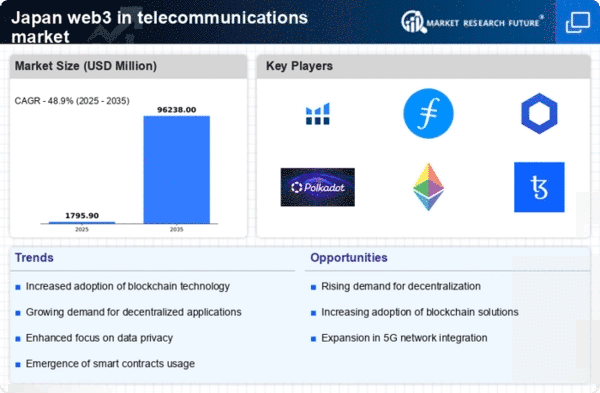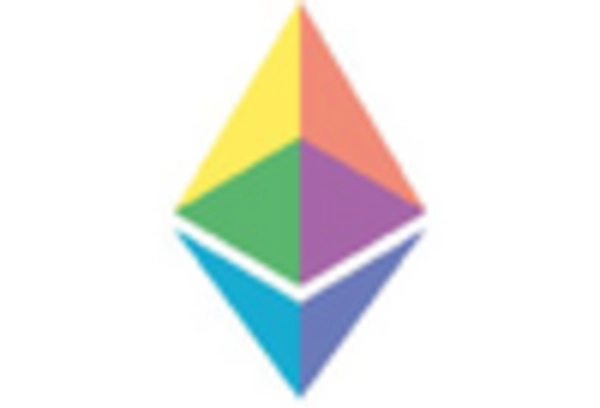Adoption of 5G Technology
The rollout of 5G technology is a pivotal factor driving the web3 in-telecommunications market in Japan. With its promise of ultra-fast data speeds and enhanced connectivity, 5G is expected to facilitate the widespread adoption of web3 applications. Telecommunications companies are investing heavily in 5G infrastructure, anticipating that it will enable new use cases such as augmented reality (AR) and virtual reality (VR) services. As of November 2025, approximately 40% of Japanese households have access to 5G networks, and this figure is likely to increase as infrastructure expands. The integration of 5G with web3 technologies could lead to transformative changes in how services are delivered, enhancing user experiences and driving further market growth.
Rise of Edge Computing Solutions
The emergence of edge computing is significantly influencing the web3 in-telecommunications market in Japan. As the demand for real-time data processing and low-latency applications increases, telecommunications providers are exploring edge computing as a means to enhance service delivery. By decentralizing data processing closer to the end-user, companies can improve network efficiency and reduce operational costs. Reports indicate that the edge computing market in Japan is projected to grow at a CAGR of 25% over the next five years. This growth presents an opportunity for telecommunications firms to integrate edge computing with web3 technologies, thereby creating innovative solutions that cater to the evolving needs of consumers and businesses alike.
Increased Demand for Decentralized Services
The web3 in-telecommunications market in Japan is experiencing a notable surge in demand for decentralized services. This shift is driven by consumers' growing awareness of data privacy and security concerns. As individuals seek more control over their personal information, decentralized platforms that leverage blockchain technology are becoming increasingly appealing. According to recent data, approximately 65% of Japanese consumers express a preference for services that prioritize user privacy. This trend is likely to propel the adoption of decentralized applications (dApps) within the telecommunications sector, fostering innovation and competition among service providers. Consequently, companies that effectively integrate decentralized solutions into their offerings may gain a competitive edge in the evolving landscape of the web3 in-telecommunications market.
Regulatory Support for Blockchain Initiatives
In Japan, the regulatory environment is evolving to support blockchain initiatives, which is a crucial driver for the web3 in-telecommunications market. The Japanese government has recognized the potential of blockchain technology to enhance transparency and efficiency across various sectors, including telecommunications. Recent legislative measures aim to create a favorable framework for blockchain adoption, which could lead to increased investment in web3 technologies. For instance, the Financial Services Agency (FSA) has been proactive in establishing guidelines that encourage innovation while ensuring consumer protection. This regulatory support is expected to stimulate growth in the web3 in-telecommunications market, as companies align their strategies with government initiatives and leverage blockchain for improved service delivery.
Growing Interest in Decentralized Finance (DeFi)
The increasing interest in decentralized finance (DeFi) is emerging as a significant driver for the web3 in-telecommunications market in Japan. As consumers become more familiar with blockchain-based financial services, there is a growing demand for telecommunications companies to offer integrated solutions that facilitate DeFi transactions. This trend is reflected in the rising number of partnerships between telecom providers and blockchain firms, aimed at creating seamless payment solutions. Data suggests that the DeFi market in Japan has expanded by over 150% in the past year, indicating a robust appetite for innovative financial services. As telecommunications companies adapt to this trend, they may find new revenue streams and enhance customer engagement within the web3 in-telecommunications market.
















